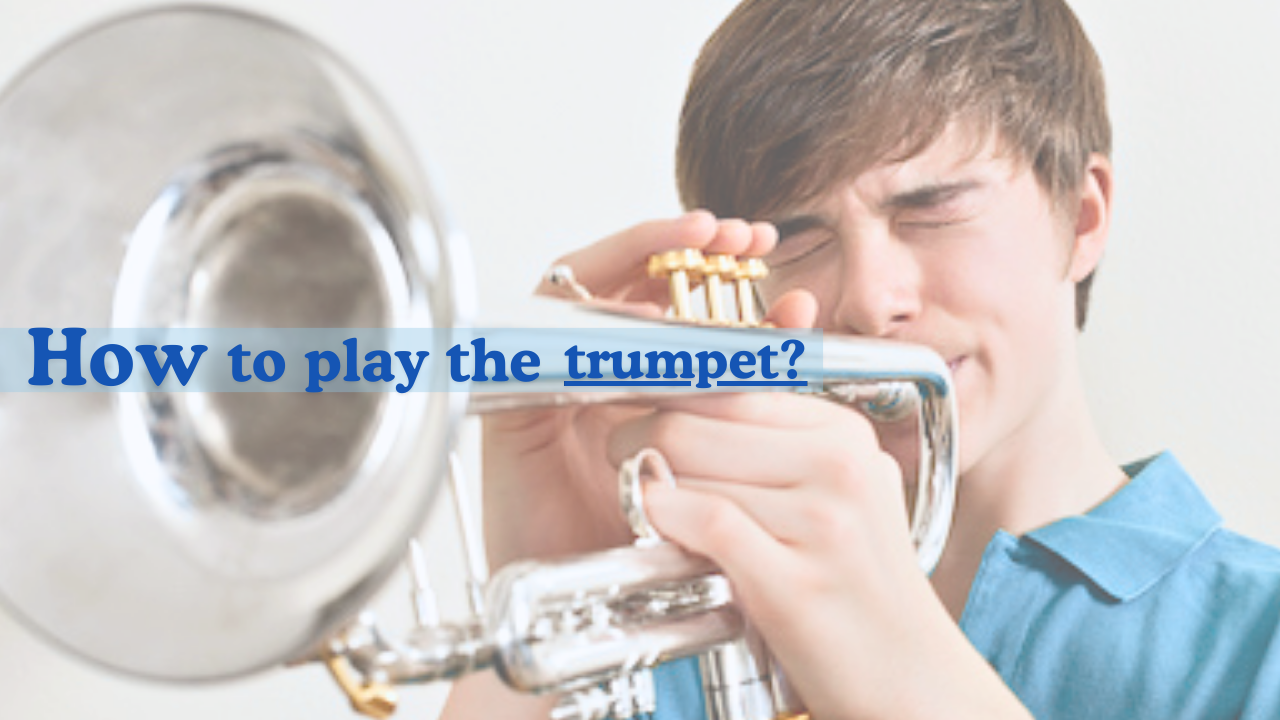Mastering the trumpet requires dedication, regular practices and readiness to navigate various challenges. In this article, we’ve prepared some valuable tips to help beginners improve their playing technique and become proficient musicians, able to produce vibrant melodies and fill musical pieces with deep emotions.
Posture
You might be eager to start learning complex melodies, however it’s crucial to begin with the correct positioning of the instrument and proper posture. The trumpeter should hold the instrument with firm but gentle grip, keeping shoulders relaxed.

Here is how you can do it: take a sitting position, move toward the edge of the chair, pay attention to the body, as it should remain upright and relaxed. You should take the position that allows blowing the air down the trumpet in the easiest way. The back must be straight, head up, and your feet firmly placed flat on the floor. Raise the instrument in way when it’s parallel to the floor or slightly angled downward. You should feel comfortable, and your trumpet shouldn’t angle to dip too much.
Breathing
Playing the trumpet requires excellent breath control and the ability to produce a steady stream of air through the instrument without gasping or forcing the sound. To achieve this goal and expand lung capacity, the musician should devote time to breathing exercises. These exercises must be a regular part of practices.

The well-known trumpeter Allen Vizzutti compares breathing exercises to the gym for musician’s lungs, which are essential for building strength and endurance. Popular breathing exercises for trumpeters include breathing in for four counts, holding for four counts, and exhaling for four counts, gradually extending the duration of each phase.
One of the effective ways of improving air control is using a diaphragm to breathe instead of breathing with the chest. The diaphragm helps produce a full and resonant sound, as it’s responsible for how air flows into and out the lungs. Breathe, paying attention to how your belly expands with inhales and contracts with exhales.
Embouchure
Embouchure is the way musicians position their lips and facial muscles around the mouthpiece. Developing the right embouchure is essential for beginners, as it lays a strong foundation for great performances.

The musicians should position their upper and lower lips evenly against the mouthpiece, forming a cushion to support the air stream. The opening between the lips should be small to have a better control over the airflow. The mouthpiece should be placed in a way when its center aligns with the center of the lips, while the rim comfortably rests on the inner edge of the top lip. The lower lip should slightly overlap the bottom edge of the mouthpiece for a better stability and control.
Concentration
Stay focused on the breath until you play the last note of the musical piece. Think about the airflow as the “fuel” needed for producing the sound. As you play, change the speed and pressure of your air stream to affect volume, tone, and articulation. Practicing long tones can help improve the air control. Try to play a sustained note at a moderate volume, keeping the air stream steady and your tone consistent.
Helpful Accessories and Tools
It’s a modern world with lots of possibilities, so why not take advantage of tools designed to make your learning process easier and improve playing the trumpet? First, use metronomes to develop a steady sense of rhythm and tuners to play the instrument in tune.
Secondly, experiment with various mouthpieces, as they can affect the tone you produce. Mouthpieces with a medium cup depth are considered best for beginners, who are seeking their sound. Various cup shapes can affect the sound in different ways: U cups produce a powerful sound, while V cups create a mild sound.
Accessories, such as boosters, inserted between the mouthpiece and the trumpet's lead pipe, can help to enhance tonal quality, enrich the overtones and provide a better stability during playing high notes, creating a more vibrant sound.
The device that can help beginners to develop the right embouchure is the trumpet embouchure trainer (T.E.T), designed to train muscles responsible for producing the sound and getting a better control of the airflow. This tool is essential for warm-ups, working on the breath and learning to play correctly from the physical point of view.
In addition, as a beginner, you should consider adding an optimizer to your collection of tools. This device helps to reduce an excessive mouthpiece pressure on the lips during practices. The excessive pressure can become a bad habit, leading to lips injuries, bloody wounds and calluses that can accompany the musician during the entire career. However, by using this device, you can control your playing and know when you apply too much pressure, as the system activates as soon as the mouthpiece is forced against the lips too hard.
Enjoy the Process
You can’t become a master overnight in any craft, including playing the trumpet. Don’t focus too much on your failures and difficulties, as they are a natural part of your personal development. Celebrate small victories, such as mastering a challenging passage or achieving a clearer tone. Don’t rush, be patient and persistent. Each obstacle you face brings you closer to achieving your goal of becoming a master.
Conclusion
Working on your posture, breathing, and embouchure, as well as using helpful accessories for trumpets can help you elevate playing technique to new levels. Don’t forget that your trumpet requires proper care and maintenance to stay in top condition and produce an awesome sound.
Stay tuned, we’re preparing more helpful guides!





 https://kgumusic.com/pages/about-us
https://kgumusic.com/pages/about-us
2 comments
Hallo.please advise me on how to compose my lips and the airflow to get very high tones out of my trumpet…and what type of trumpet is producing high tones.
Than you very much.
Regards
I thank you for this much needed article as I have been having challenges with my embouchure and tone over the years. I’ll take to the tips provided and create better sounds hence.